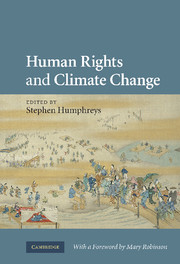Book contents
- Frontmatter
- Contents
- Authors' biographies
- Acronyms
- Acknowledgements
- Foreword
- Introduction: human rights and climate change
- PART I Rights perspectives on global warming
- PART II Priorities, risks and inequities in global responses
- Conclusion
- 11 Conceiving justice: articulating common causes in distinct regimes
- Appendix: climate change impacts on human rights
- Index
- References
11 - Conceiving justice: articulating common causes in distinct regimes
from Conclusion
Published online by Cambridge University Press: 04 August 2010
- Frontmatter
- Contents
- Authors' biographies
- Acronyms
- Acknowledgements
- Foreword
- Introduction: human rights and climate change
- PART I Rights perspectives on global warming
- PART II Priorities, risks and inequities in global responses
- Conclusion
- 11 Conceiving justice: articulating common causes in distinct regimes
- Appendix: climate change impacts on human rights
- Index
- References
Summary
It is often said that climate change confronts the present generation with a challenge greater than any previous. If so, the global nature of the challenge is perhaps timely, in that it comes at a time when the ‘present generation’ might itself be thought of, really for the first time, as ‘global’. But if several decades of the phenomenon still generally called ‘globalisation’ have helped to create a global audience for this global challenge, it is far less clear that this same event has provided the ‘global’ public policy tools with which the challenge can be managed. Certainly, the ‘promotion’ of human rights and the rule of law around the world in recent decades has not aimed at, or led to, the empowerment of governments to address pressing social and economic rights; if anything the reverse has been the case. Insofar as development policy has concerned itself with law and rights, the emphasis has been firmly on economic freedoms – property rights, contract, investors' rights, banking and commercial law – and judicial enforcement. There has been some attention to civil and political rights, notably gender equality and press freedom, but relatively little to rights to food, water, health, shelter and so on. At the same time, there is an at least plausible case – perhaps best presented in the writing of Thomas Pogge – that the persistence and exacerbation of global poverty over recent decades is itself a human rights violation, largely sustained by international actors and systematised through international law.
- Type
- Chapter
- Information
- Human Rights and Climate Change , pp. 299 - 319Publisher: Cambridge University PressPrint publication year: 2009
References
- 2
- Cited by



